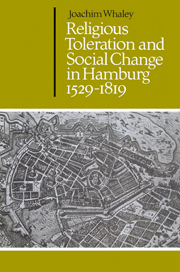Book contents
- Frontmatter
- Contents
- Preface
- Abbreviations
- Illustrations
- Introduction
- 1 The struggle for political stability and purity of belief: Hamburg from Reformation to French Revolution
- 2 The politics of toleration: the Catholic community
- 3 The limits of toleration: Sephardim and Ashkenazim
- 4 The growth of toleration: the Calvinist communities
- 5 Patriotism versus Orthodoxy: the struggle for limited religious freedom, 1760–85
- 6 The image of the city: the search for a tolerant society in early modern Hamburg
- 7 The aftermath
- Bibliography
- Index
- Frontmatter
- Contents
- Preface
- Abbreviations
- Illustrations
- Introduction
- 1 The struggle for political stability and purity of belief: Hamburg from Reformation to French Revolution
- 2 The politics of toleration: the Catholic community
- 3 The limits of toleration: Sephardim and Ashkenazim
- 4 The growth of toleration: the Calvinist communities
- 5 Patriotism versus Orthodoxy: the struggle for limited religious freedom, 1760–85
- 6 The image of the city: the search for a tolerant society in early modern Hamburg
- 7 The aftermath
- Bibliography
- Index
Summary
In the late sixteenth century, Hamburg provided an attractive haven for many whose livelihood was threatened in Western Europe by the turmoil and persecution which accompanied the Reformation and the Religious Wars. From the 1580s, Catholics, Calvinists and Jews began to settle there. Later exiles, such as the Huguenots, also gravitated to the city, which had become the most prosperous and dynamic commercial centre in Germany by 1700.
Collectively, the immigrants had a substantial impact on the development of the city's economy. Their importance was recognised from the start. But the process of acceptance and establishment was both long and difficult. For the liberal policies of the mercantile Senate repeatedly came up against the opposition of the clergy, who for two centuries struggled to maintain the exclusive position of the Lutheran Church in Hamburg.
The fortunes of the original immigrant groups differed markedly. The Sephardim were replaced by the poorer Ashkenazim within sixty or seventy years. But although the latter also provided valuable economic skills, the Jews were exceptional from beginning to end. They were thoroughly alien in terms of both race and religion, and although a significant attempt was made to give them religious freedom in the 1740s, they were not included in the toleration debate after 1760.
The Catholic community also changed, losing its original mercantile character.
- Type
- Chapter
- Information
- Religious Toleration and Social Change in Hamburg, 1529–1819 , pp. 206 - 216Publisher: Cambridge University PressPrint publication year: 1985



